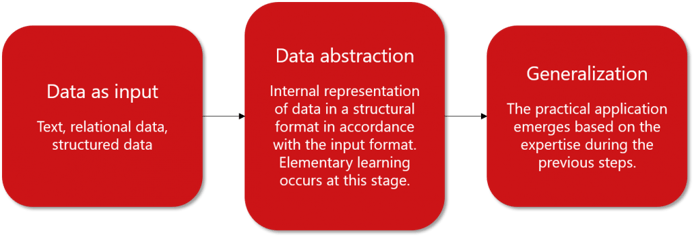Why do you need machine learning to manage big data?
The volume of data that requires processing these days is too great for any individual to analyze comprehensively, nor is it possible to recognize potential connections or interrelations within big data. In fact, it is often impossible for data analysts to test all their hypotheses on a single data set let alone extract all its information.
Machine learning, on the other hand, can open many possibilities offered by big data.
Through a data driven approach and flexible scalability, machine learning is less reliant on human guidance than other systems. It can adapt appropriately to the complexity of different data sets and identify interrelations more precisely.
An iterative approach to machine learning

Our know-how
Machine learning is constantly evolving through innovative ideas and platforms. That’s why our team makes sure to keep up to date with the latest developments and has already implemented projects with the Google Cloud Machine Learning platform, Microsoft’s Azure Machine Learning Studio as well as Amazon Machine Learning. Through new learning strategies and approaches, we can individually tailor powerful and scalable learning systems to meet every challenge.
If cloud-based systems do not meet your requirements, we are also able to offer our own high-performance learning systems. Depending on the application in question, these can switch between various programming languages, e.g. Java, Python or R are selected.
Application scenarios
Predictions can be made within various business units on the basis of predictive analytics. Predictive analytics can be applied to, for example, e-commerce. An overly large diversity of choice can overwhelm individual customers. Here predictive analytics can be used to evaluate customer behavior and tailor product selections to the customer, creating an optimal shopping experience.
Banks, insurance companies and other firms still suffer large cumulative losses due to fraud. Through classification models, suspicious patterns can be identified and reported. This enables companies to respond and eliminate emerging problems much more quickly.
Interactions on social networks have changed public communication and generate large amounts of data – data which contains important information for companies. Through sentiment analyses, emotions and moods as communicated via social media can be recorded and interpreted, providing valuable insights into the behavior of target groups.
Companies have to deal with unstructured data on a daily basis. The complexity of natural language can make it difficult to extract specific information from data sets. The aim of information extraction is therefore to automatically and efficiently present the information contained within data in a structured and easily comprehended format.

Mr. Sieder
Managing Director
service@sgc.de